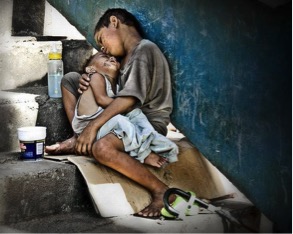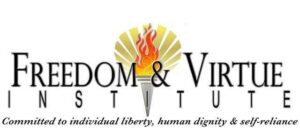Human universals are often lost within the choreographed discussions on specifics about poverty in America. Policy debates and political ideology often sinks us into one of those silences that fill public life wherever meaningful debate is needed. Political correctness has the ability of stifling questions of value in favor of the agreements of fake civic commonality. Let us not rock the boat even if it is sinking fast.
One of those human universals refers to the reality of the primacy of the human person as unique and unrepeatable. Made in the very image of God, the individual human person is endowed with a radical capacity for moral self-realization; one that is best exemplified by our ability to know the truth and choose the good. Yet, it is tempting to simply speak of “the poor” or of “blacks and Hispanics” as if they are a mass of undifferentiated humanity. Clustered into blobs of generality, we can lose sight of the uniqueness of people in an expansive and yet shallow sea of color and class.
 Unfortunately, there are those who benefit from grouping people as if they were herd. The detrimental effect goes further when there are webs in our self-esteem, as we might be tempted to use the cover of the label for the momentary illusion of benefit. The faint itch calling for obviating personal responsibility for our lives tickles us at times when what we need is an affirmation of individuality from the clutches of group consciousness. We love to ask what are the unmet needs instead of wondering what it is that makes human beings to flourish.
Unfortunately, there are those who benefit from grouping people as if they were herd. The detrimental effect goes further when there are webs in our self-esteem, as we might be tempted to use the cover of the label for the momentary illusion of benefit. The faint itch calling for obviating personal responsibility for our lives tickles us at times when what we need is an affirmation of individuality from the clutches of group consciousness. We love to ask what are the unmet needs instead of wondering what it is that makes human beings to flourish.
It happened within our family a few years ago when our daughter was invited to a “scholar’s night” at a university she was hoping to join. It turned out to be a “let us get our quota of blacks” night. From then on she determined to write “none of your business” wherever forms ask for your race. But we go on talking about “the poor” as if we are about to write a paper instead of encountering real flesh and blood.
Amalgamation also seduces people into provocation and antagonism in the claiming of “rights.” The end of that route leads to the identity of victimhood and the assumption of entitlement. The reality remains that no one really knows how the poor live; we can only discover traces of generality when we lose sight of “Jose Perez” or John Smith” and their actual condition. Community flows from the recognition of methodological personalism: groups are more easily recognizable through the lives of real persons.
Recently I was asked, “Do you really expect that we meet every poor person?” That is exactly what I am saying. Government bureaucracies are often the inevitable response that flows from the surrendering of our responsibility for each other. Bureaucracy is the inadequate response to complexity. Unto the shallowness of human encounter a faulty response full of stereotypes is added and we go by thinking that we have solved the problem because we have bureaucracies of compassion in place.
“What is your social? How much you make? Here is the reward for your poverty.” I have seen good, decent and frustrated civil servants working in these systems and trying their best to help. They know that the task assigned to them is daunting but as a nation bored in our affluence we have chosen the easy way out. By surrendering our responsibility and transferring it to systems we gain innocence, an innocence that inflates our pretended superiority and deflates the dignity of those who are tied to the manacles of statist control, tied to cradle to grave systems trapping people whose dignity is there, living and real, but barely breathing under the weight of the free stuff we dump at them.
Only a return to the primacy of the individual human person will offer us the entrance to a true sense of community. Only a recommitment to our responsibility for each other will allow for statist control to recede and civil society to grow.


